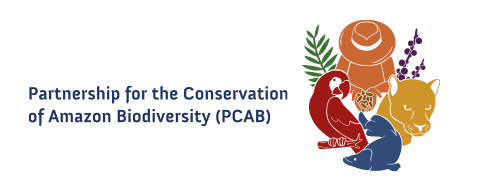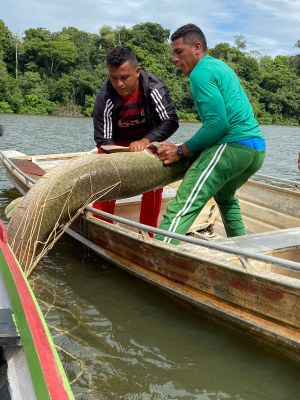Carauari residents are trained on how to process wild pirarucu
A group of 30 people, half of whom were women, was trained early this year to work in the wild pirarucu sustainable management chain. Their training included theoretical and practical lessons and was delivered in the municipality of Carauari, in the Médio Juruá region. Participants learned different fish handling techniques, including cleaning, cutting, freezing, and packaging.
The initiative was run by the Carauari Rural Producers Association (ASPROC), together with the Chico Mendes Memorial (a member of the Pirarucu Collective), and INSEQ, a food safety consultancy firm.
It is part of the Value Chains Project, carried out in partnership with the Brazilian Education Institute (IEB), with technical assistance from the US Forest Service (USFS) and the Chico Mendes Institute for Biodiversity Conservation (ICMBio), and support from USAID/Brazil.
All COVID-19 health safety and prevention protocols were adopted during the training, including a requirement for all participants and instructors to wear masks and other PPE, in addition to observing social distancing and hygiene measures.
The trainees will work at a new warehouse in Carauari for the processing and freezing of wild pirarucu fished by local riverine and Indigenous managers.
Fishing season begins this September in the Juruá River region. Each community sets the managers’ fishing dates, as agreed during the planning stages. This system has been instrumental to protect the pirarucu, a species that became threatened in the Amazon in the 1980s.
The sustainable management of wild pirarucu, one of the largest scaled fish in the world, ensures the forests and waters in the areas where the activity takes place are protected from threats and external pressures. It promotes the conservation of pirarucu and other species, maintaining ecosystem services, and helping to avoid carbon emissions and mitigate the effects of climate change.
Strengthening participatory pirarucu management and marketing at fair prices are among the objectives of the Gosto da Amazônia collective brand (Taste of the Amazon), created in 2019 by the Pirarucu Collective, it has been developing joint strategies to enhance the production chain.
Building together — The Pirarucu Collective is a network of Indigenous and riverine fishers from the Negro, Solimões, Juruá and Purus river basins. Their governmental and non-governmental partners develop joint strategies to enhance and strengthen fish management. Currently, it represents about 4,000 managers in approximately 30 areas, including Indigenous Lands, extractive reserves, and sustainable development reserves.
With support from the Collective, ASPROC centralizes all commercial arrangements related to Taste of the Amazon, ensuring that pirarucu managers are paid fairer prices — up to 60% higher than the average price from local markets.
Another achievement is the review and increase in the minimum price paid for managed pirarucu under the Food Acquisition Program (PAA), run by the National Supply Company (CONAB), an agency linked to the federal government.
In addition, pirarucu management became eligible for subsidies under the Minimum Price Policy for Socio-biodiversity Products (PGPM-Bio). Pirarucu now has a minimum price guaranteed by CONAB. As a result, artisanal fishers are entitled to financial aid, as long as they can provide evidence they sold their fish for less than the minimum price.


